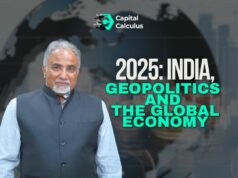In the third of our series on maritime chokepoints, we look at the importance of the Suez Canal. Roughly 12 to 13 percent of global cargo trade passes through the Suez Canal — but its real significance, says Nilanthan Niruthan, Executive Director of the Centre for Law and Security Studies in Colombo, lies in energy. “The world’s energy security is synonymous with the Suez Canal’s security,” he notes, calling it “the most geopolitically important chokepoint in the world today.”
Built by the French in the 1860s to link the Red Sea and the Mediterranean, the Suez Canal drastically cut travel time between Europe and Asia and reshaped global trade. “It made the modern world possible,” Niruthan observes. “Out of all chokepoints, Suez has had the biggest impact on modern life because it facilitated the global energy trade.”
India’s Most Tangible Strategic Trump Card: Malacca
That dependence also makes it a vulnerability. The six-day blockage by the container ship Ever Given in 2021, he says, exposed how quickly global supply chains can crumble. “Human error is something we can never really discount. It could absolutely happen again,” he cautions. “And how many countries have a Plan B for that?”
A prolonged disruption, he explains, would force ships to take the far longer route around Africa, driving up costs and delivery times. Alternatives like the Bab-el-Mandeb Strait or the Strait of Hormuz are crucial links, which is why countries compete for a military foothold in Djibouti.
Trump’s LatAm Offensive Holds Stark Lessons for India
Niruthan recalls how the 1956 Suez Crisis marked “the opening glories of the globalist period,” when international pressure forced Britain, France, and Israel to withdraw despite military success. But he warns that era of diplomatic restraint is fading. “In today’s world, that convention keeping the canal open is just a piece of paper.”
For South Asia, the stakes are existential. “Smaller nations like Sri Lanka, Bangladesh, and the Maldives are extremely vulnerable to energy shocks,” he says. “If Suez were blocked, we couldn’t afford the alternatives. Energy might still exist—but we wouldn’t have the dollars to pay for it.”
In a career spanning three decades and counting, Ramananda (Ram to his friends) has been the foreign editor of The Telegraph, Outlook Magazine and the New Indian Express. He helped set up rediff.com’s editorial operations in San Jose and New York, helmed sify.com, and was the founder editor of India.com.
His work has featured in national and international publications like the Al Jazeera Centre for Studies, Global Times and Ashahi Shimbun. But his one constant over all these years, he says, has been the attempt to understand rising India’s place in the world.
He can rustle up a mean salad, his oil-less pepper chicken is to die for, and all it takes is some beer and rhythm and blues to rock his soul.
Talk to him about foreign and strategic affairs, media, South Asia, China, and of course India.




